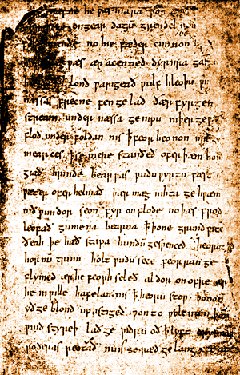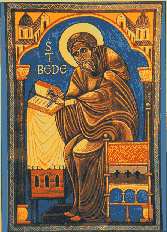 The Beowulf Manuscript |
History
of the English Language English 440 Spring 2006 |
 The Venerable Bede |
 The Beowulf Manuscript |
History
of the English Language English 440 Spring 2006 |
 The Venerable Bede |
|
Instructor: Charles
Meyer
Office: Wheatley 6-68 Office Phone: 287-6748 (with voice mail) To get this syllabus on line, go to: http://www.cs.umb.edu/~meyer/courses/eng440.html E-Mail: meyer [at] cs [dot] umb [dot] edu Office hours: T: 2:30-4:00, Th: 2:00-3:30, or by appointment |
|
Required Text Baugh and Cable, A History of the English Language, 5th ed., which is available in the bookstore and on reserve under my name (note: used copies of the hardbound and paperback version of this book are available on Amazon US and also Amazon UK, which will ship the paperback version of the book by airmail; the library has the book available in digital form; just go to the card catalog and search for the following keywords: 'a history of the english language cable') Course Goals English 440 has three primary goals: (1) to study the linguistic changes that English has undergone from Old English to the present; (2) to familiarize you with the linguistic concepts necessary for understanding how English has changed; and (3) to explore the cultural events that accompanied and sometimes influenced these changes. Course Requirements
|
|
Syllabus
Introduction Jan 24 and 26: Course overview; Course policies and requirements; Meyer "The Study of Language" (on e-reserve) Language Change and The Origins of English Jan. 31 and Feb. 2: HEL, Ch. 1 "English Present and Future"; David Wilton, "A (Very) Brief History of the English Language"; PBS, Do You Speak American? "The Truth about Language Change"; Culpeper, "The Birth of English: Clues in Placenames" (on e-reserve) Feb. 7 and 9: HEL, Ch. 2 "The Indo-European Family of Languages"; Language families: "Ethnologue Language Family Index"; Nicholas Wade, "What We All Spoke When the World Was Young"; James Crawford, "Endangered Native American Languages: What Is to Be Done, and Why?"; Introduction to Modern English Grammar Feb. 14 and 16: Our discussion this week will be based on the presentation of grammar in the "Internet Grammar of English" Old English Feb. 21: HEL, Ch. 3 "Old English"; Wikipedia, "The Venerable Bede"
Feb. 23: "Beowulf in Hypertext"; "The Anglo-Saxon Chronicle" (translation); Paper #1 due Feb. 28 and March 2: HEL, Ch. 4 "Foreign Influences on Old English" Middle English March 7 and 9: HEL, Ch. 5 "The Norman Conquest and the Subjection of English 1066-1200"; HEL, Ch. 6 "The Reestablishment of English, 1200-1500" March 14 and 16: No Class, Spring Break
March 21: HEL, Ch 7 "Middle English"; Chaucer, "General Prologue" March 23: Mid-Term Exam The Renaissance March 28 and 30: HEL, Ch 8 "The Renaissance, 1500-1650"; Shakespeare, "Internet Shakespeare Editions" "Othello" Prescriptive Grammar April 4: HEL, Ch 9. The Appeal to Authority, 1650-1800
April 6: Geoffrey Nunberg, "The Decline of Grammar"; Paper #2 due The 19th Century
April 11 and 13: HEL, Ch.10 "The Nineteenth Century and After"; Denis Baron, "Excerpt from Grammar and Good Taste" (on e-reserve); "About the Oxford English Dictionary" (note: look through the links in the right hand column too) American English
April 18 and 20: HEL, Ch. 11 "The English Language in America"; H.L. Mencken, "The Beginnings of American," Ch. 2 of The American Language
(read all of Ch. 2, which has six subsections; when you finish a page,
just click 'next' at the top or the bottom of the page); William Labov, Sharon Ash, and Charles Boberg, "A National Map of the Regional Dialects of American English"
April 25 and 27: Boston and New England Dialects: Craig Carver, Ch. 2 of American Regional Dialects: A Word Geography (on e-reserve); Public perceptions of the Boston dialect: "Wicked Good Guide to Boston English" May 2 and 4: Social and Ethnic Dialects: William Labov, "The Social Stratification of /r/ in NYC Department Stores" (3 files on e-reserve); Jack Sidnell "African American Vernacular English (Ebonics)"; Ralph W. Fasold, "Ebonic Need not be English"; "Yiddish Words Found in English"; Wikipedia, "Spanglish" May 9: Paper #3 Due THIS SYLLABUS IS SUBJECT TO CHANGE AT ANY TIME: Due dates for exams and written assignments will not change, but I will revise the schedule of readings if we fall behind. |